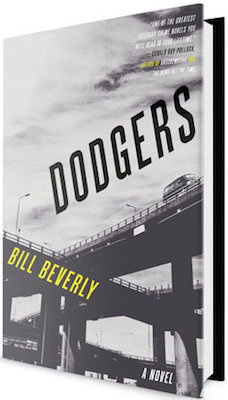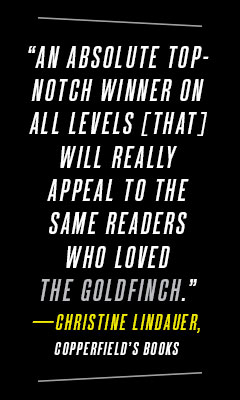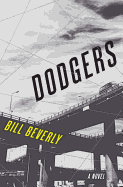Dodgers
by Bill Beverly
Every once in a while a debut novel comes along that is so startling and well-written that one has to ask about its author: "Who is this guy?" Dodgers is one of these, and Bill Beverly is that guy. A Michigan-born and -raised academic (Ph.D. in American Literature, associate professor of English at Trinity College in Washington, D.C.), Beverly seems to have tossed aside his credentials to slide easily and confidently into the vernacular and circumscribed world of young black gangbangers from the streets of Los Angeles as four of them set out for Wisconsin in a nondescript blue van on a "just business" mission for the gang's top dog, Fin. Dodgers is a road trip novel, a coming-of-age novel, a crime novel--and more. It's hard not to hear echoes of Huckleberry Finn here--or On the Road, Lord of the Flies, Clockers, The Road--but there is nothing derivative about Beverly's tale of four black kids from Compton confronting white Middle America for the first time. Dodgers is a novel as durable and expansive as the early-winter trees 15-year-old East notices along the Iowa-Wisconsin border: "Trees unlike the trees in L.A: these rooted hard, grew up tall, muscular, their bare limbs grabbing all the air in the world."
In the van's middle bench rides East, Fin's loosely related nephew who has risen from drug house lookout to running a crew of younger kids because he "looked quiet and kept quiet... there wasn't much to him. But he watched and listened to people." East's "shambling and grinning" younger brother, Ty, takes the back seat, thumbing his video game with "already something chiseled in him... like the midair coil the whip made between handle and crack." At the wheel is the oldest, fast-talker Michael Wilson, who dropped out of college when he reported back to Fin "there was more weed at UCLA than you could keep track of," so it was a better source than a market. Sitting shotgun, fat Walter is Fin's fixer and problem solver--"he played around a thought, discarded it, played around another." As the crew prepares to head East with a roll of gang cash and fake IDs, Fin's second-in-command, Johnny, takes them to buy new L.A. Dodgers gear because "white people love the Dodgers." Despite their grousing about the lame van and new tees, he tells them: "you ain't gonna look like ignorant gang boys, which is what, in fact you are... in this car you look like four mama's boys going to a family reunion, which is what you want to look like."
And so they set out, without cellphones or connection to their drug 'hood known as The Boxes, and make their way through the mountains and the plains. Cocky Michael Wilson gets them into their first trouble when he pulls into a Vegas casino for a taste of high-life gambling; Ty gets them out of it. East takes the wheel in Utah, even though he's never driven over 40 in the city, and soon he's cruising at 75 as the others sleep, savoring the quiet and the van: "sorry-looking, yeah, but solid. He liked being up high, liked the firm seat." In Colorado, Michael Wilson finds more trouble trying to pick up a truck-stop girl hitching down the highway. East confronts him and they fight. The volatile Ty fixes this one, too, and Michael Wilson is left behind. As they move through empty Nebraska to Iowa and finally Wisconsin, Beverly captures East's innocent wonder at the edges of Midwestern towns, the "tipped, sunken sidewalks... bacon-smelling restaurants and used-car lots laid out precisely, wheel facing wheel, headlights polished and aligned, everything eyeing everything else." At a small lake in central Wisconsin they find their target, and Ty again takes care of business, like "a monster who rises out of the sea and then submerges."
But things go south. Their van gets vandalized and spray-painted with a racial slur by local kids out trashing for fun. Always on edge, brothers Ty and East get crossways over stealing a different car to get home. Walter puzzles out a way to score himself a plane ticket out of Des Moines. Alone, East makes his way farther east to a small town in Ohio, where, exhausted with running, he settles into a job at a paintball range cleaning the lockers, renting equipment, policing the grounds, enforcing the rules, and becoming the go-to guy for the terminally ill owner, Perry Slaughter. Symbolically, East finds a worn Ohio State T-shirt emblazoned CHAMPION, and so he "wadded up the last bitter Dodgers T-shirt and stuffed it into the trash. Farewell to baseball. Farewell to all that white people's love." Slaughter trusts him, and East builds a new life as a de facto black cop in a white-guy war games world--until someone from Fin's crew back home finds him.
Before he determines whether to run again, he sits at Perry's death bed; Beverly catches the precise pathos of the scene: "Perry's breathing was soft and tinkly, glasslike, like a stone rattling in a bottle as it rolled. It tumbled and slowed, tumbled and slowed... then the bottle bumped up on something, rolled no further." With a sense of obligation and responsibility, East cleans the range and shop one more time. He ponders his future and makes a Huck Finn "light out for the territory" decision, knowing that "there was nothing in it, running. He could open a gap between now and his old life. But only a gap." With the savvy of a much more prolific writer, Beverly plants a powerful conclusion on a powerful first novel. Dodgers is brilliant with no more than it needs--and no less. --Bruce Jacobs









